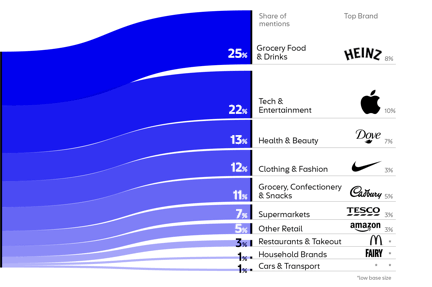Perspectives

Introduction: The debate on brand love
Lately, there has been a resurgence of people in market research industry talking about the power of brand love, with masses reigniting their passion for the branded products and services marketed to them. Some have even suggested that this level of brand affinity could drive people to tattoo their favourite logo on their upper shoulder.
Sceptics will argue that there's no evidence people feel strong emotions toward grocery products - let alone the everyday services that keep the economy and society running. Who even remembers the brand names of the last three products they ordered on Amazon? And Amazon itself - it's just a logistics company, right? With Prime, an even more efficient one. Or is that completely wrong? If choosing a supermarket's own-label product signals a shift away from brands, when did we all agree that supermarkets themselves aren’t brands?
Do people really care about brands? The experiment
As someone in insights, I prefer data over speculation. We conducted a consumer behavior study, asking 1,000 people how they would feel if there were only one supermarket – simply called The Supermarket. Inside, there were no brands, just products, all packaged in a uniform white, eco-friendly design with black-font labels like “Washing Powder” or “Breakfast Corn Cereal.” Everything would be available, ensuring total physical availability.
The results were evenly split:
- Half would be unhappy, preferring the choice of brands.
- The other half would be content with just products.
- Regardless of preference, the majority (58%) believed the products at The Supermarket would be of good quality - an example of Social Proof (if everyone shops there, it must be good).
We extended the experiment to cars: What if everyone drove the same white, five-door hatchback called The Car, with the only choice being hybrid or electric?
- Slightly more people (53%) favoured having a choice of make and model.
- 47% were content with a standard, economical car.
This suggests that while many appreciate brands and choice, a substantial portion of the population is open to functional standardization. However, when given the option, most people still lean towards brand preference.
Why brands matter — and the fundamental pillars that drive their growth
It’s clear that brands play a role in consumer choices. In fact, 64% of the 1,000 people we asked said they liked seeing the brands they buy extend into multiple categories. Beyond availability and price, consumers decide where to be cost-conscious and where to splurge - sometimes opting for trusted brands even when they cost more.
The fundamentals of brand growth remain unchanged:
- Brand Visibility: A brand must be visible.
- Brand Relevance: It must offer something personally relevant.
- Brand Storytelling: It must communicate clear benefits that set it apart.
- Purpose-driven Marketing: Consumers must be willing to buy, advocate for, and overcome barriers for the brand.
Is this brand love? Or is it a more nuanced emotional connection?
Turning brand essence into experience: Reinforcing values that matter to customers
I’d like us to consider the idea that people often choose brands to define who they are or shape how they want to be perceived by their consumers. Brands with strong emotional connections tend to be those that align with a consumer’s identity - both practically and socially.
Just like individuals, brands have defining characteristics shaped by their beliefs, behaviors, and identity. Consumers gravitate toward brands that share their values and, at times, adopt a brand’s traits to make a personal statement. Marketers reinforce these brand values through multiple touchpoints:
- Logos and packaging
- Influencer collaborations
- Marketing style and messaging
These elements form the mental associations and distinctiveness that make a brand desirable.
To build a lasting relationship with consumers, a brand must offer something compelling that sparks curiosity and engagement. This intrigue, interest, and participation can be cultivated over time, shaping the brand to deliver both commercial and emotional value - strengthening its equity and appeal.
By clearly defining your Brand Essence and ensuring all Brand Experiences align with this foundation, you're more likely to connect with your brand’s audience, be remembered, and even become a preferred consumer choice. Consider your brand identity, tone of voice, communication style, and presence in the social environment - how do these elements resonate with and reinforce your audience’s values and perspectives? Ideally, they should align but not be identical. To remain desirable, a brand must maintain a sense of attraction and intrigue.
Popular belief suggests that branding has little influence on purchasing decisions - people simply buy what’s available when they need it, as long as the price is right. However, if consumers have a positive predisposition toward your brand and it’s accessible, they may become your true shoppers choose you over competitors, even at a slightly higher price. That said, ensuring your product or service is easy to find, purchase, and interact with remains essential.
Irreplaceable brands: What drives deep emotional loyalty
To understand what makes a brand irreplaceable, we surveyed 600 people, asking which brands they are emotionally connected to and why.
- 20% had no strong brand preference.
- 80% identified two brands they considered essential.
- Their reasoning? These brands were simply the best at what they do.
Here’s how brand mentions broke down:

Emotional branding in action: When consumers see themselves in the brand
We asked respondents which brands best represented them to test whether people see brands as personal identifiers. The dominant response across categories was that brands help individuals express themselves emotionally.
Some illustrative examples:
- “My iPhone goes everywhere with me, an extension of me. Multi-purpose and clever”
- “Nike is for cool cats like me. I'd also like to imagine I'm sporty. The swoosh is my statement”
- “Dove, represents beauty in a real and authentic way, this appeals to me”
- “L'Oréal Men Expert as it's made for men, works really well and gives me confidence”
- “Boss, it’s my ultimate style and I am the Boss”
- “Dr Marten, not boring and somewhat alternative”
- “Cadbury’s, like me, a British golden oldie that keeps up to date”
- “Heinz keeps the family together and happy”
- “M&S, its’ British quality, friendly to everyone. It’s like a warm hug from your nan”
- “Sainsburys as it is helpful and well organised- just like me!”
Fragile loyalty: One bad customer experience can undo years of brand trust
Brand belief, emotional connection, and customer experience are fragile. When asked if they had ever felt dissatisfied with a brand, the majority (80%) expressed strong negative emotions.

This underscores the importance of brand trust and customer experience management - a poor experience can undo years of emotional connection. Consumer Research suggests that remedying a negative brand experience takes eight times the effort and investment compared to building a positive one.
The emotional payoff of brand connection: How emotional branding builds loyalty and trust
When a brand successfully creates a relevant emotional connection with consumers, it gains:
- Brand Trust & Reliability (20%): Consumers are more likely to feel a strong sense of trust and reliability towards your brand, believing it will consistently deliver quality products that meet their expectations. This trust often results in feelings of security and confidence when using your products.
- "I like the reassurance that I know the product…. It’s been good before, so I trust it."
- Consumer satisfaction and Contentment (18%): Many expressed feelings of satisfaction and contentment when using products from brands they admire. This theme highlights the emotional fulfilment from engaging with brands that meet consumer needs and preferences.
- "Satisfied I have a quality product that matches my requirements."
- Brand Quality Assurance (16%): They also frequently mentioned quality as a significant factor in their admiration for certain brands. This theme reflects the associations with high standards and consistent performance in maintaining consumer loyalty and admiration.
- "Based on quality, I know I am getting the best."
- Emotional Connection (12%): Some respondents directly indicated that their relationship with admired brands goes beyond functionality, extending into a deeper emotional connection. This theme covers feelings of belonging, pride, and personal expression associated with certain brands.
- "I feel like I belong to the exclusive group of people!"
- "It's history. I feel that I am a part of something when I wear the brand."
- "Proud and chuffed that I know about the brand."
- "It makes me feel empowerment."
These factors reinforce a brand’s desirability and long-term customer loyalty.
Final thoughts: Building lasting consumer-brand relationships
For a Brand to successfully grow, any interaction with the brand should support the fundamental building blocks with quick response to any customer experience issues that could be detrimental to the brand. If they don’t and a person is left disappointed and let down, then it will take eight times the effort and investment to remedy the damage.
Therefore, to sustain a growing brand, Marketers need to consider both the Brand Equity and Brand Experience. If these are not measured and monitored together, then Marketing activity could be going to waste.
In summary, building a lasting emotional connection with your customers is about giving them reasons why your brand delivers against the values and characteristics they appreciate, identify with and makes them feel good; and that others around them will notice.
I leave you with three questions to consider in your journey towards building brands for the long term: -
- How does my brand create a relevant personal connection - so much so that customers see it as part of their identity?
Consider embedding your brand into daily rituals and meaningful moments. - How can I ensure every brand interaction strengthens associations and desirability?Align all departments with the brand blueprint, ensuring seamless customer experience.
- How can I inspire brand advocates?
Build communities and platforms where fans can share experiences, making advocacy natural and rewarding.
By answering these questions, you can help your brand secure its place not just in the market, but in people’s lives.
Talk to our team of experts
Learn how we can deliver actionable insights and creativity to drive brand growth.







